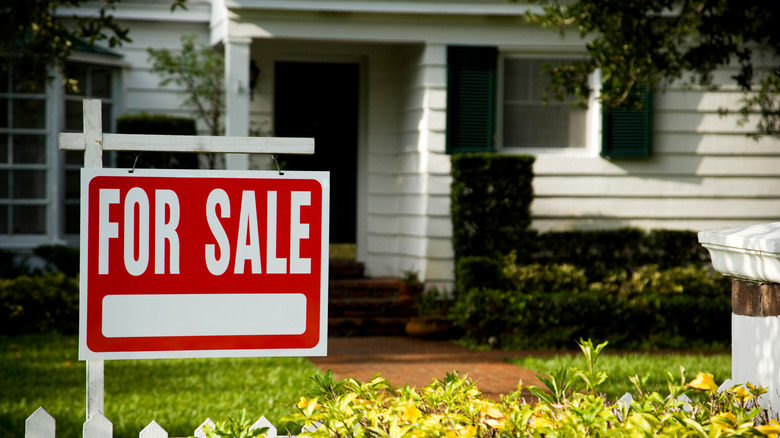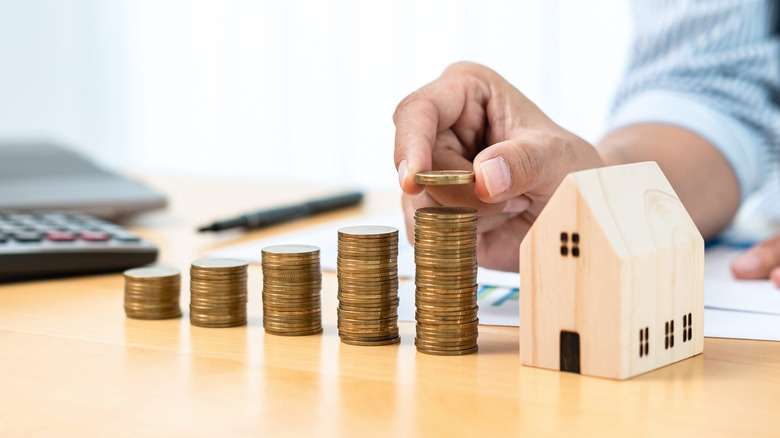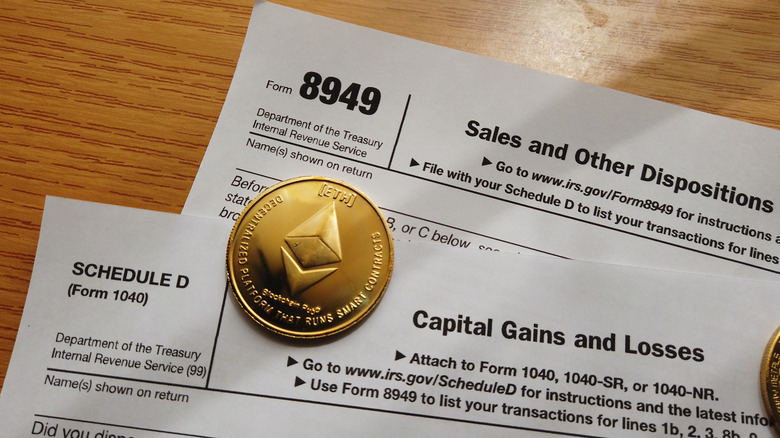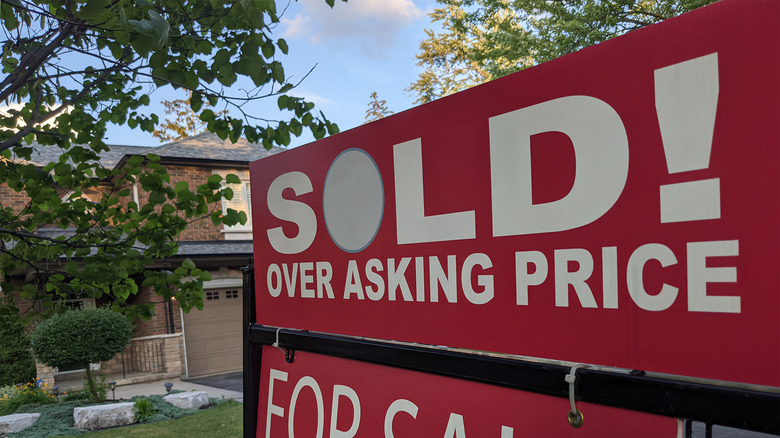Here's How Long You Should Live In A House Before Selling It
With all the conversation about how hot the U.S. housing market is, you may well be wondering if now is the best time to sell your home. But what if you just bought your house within the past few years or even this past year? You may have the sense that conventional wisdom dictates that you should stay in a home you've purchased recently for at least a little while. How long is "a little while," though? At what point can you sell your property and make a smart financial decision at the same time?
Rocket Mortgage explains that there is no one-size-fits-all motto for how long you should stay in your home before selling it. The amount of time you own your place before you put it on the market can significantly impact your ability to make a profit when you finally sell it.
Still, several other variables can influence exactly how large that profit ultimately turns out to be. These variables include how much you originally paid in closing costs when you purchased the residence, the impact of any capital gains tax that may be levied against you when you sell it, the current status of mortgage interest rates, and a number of other factors as well.
Home equity is crucial
Essentially, the amount of profit you will net from a home sale depends on one crucial aspect of ownership: how much equity you have built in your property. Investopedia defines home equity as the value of the interest a homeowner owns in their house, aka how much the place is worth, minus any outstanding loan obligations. If you purchased your residence in cash, congratulations! Your home equity is simply the market value of your property. But if you have a mortgage, the equity can be a little more complicated and can be significantly impacted by the length of time you have owned your house.
Home equity tends to increase over time as a homeowner makes more payments on their loan, reducing their mortgage principal and interest. Unfortunately, home values also tend to increase over time, widening the gap between how much a homeowner can sell their property for and how much they still owe on their loan.
Rocket Mortgage points out that as real estate markets become more popular, house value can increase rapidly, so you may not need to wait too long for the equity to skyrocket, particularly in areas of the country with especially hot housing markets. But, if you sell your home before you have paid off a significant portion of your mortgage loan, a big chunk of the sticker price for your house may need to be given right back to the bank.
Your mortgage's impact on equity
The amount remaining on your mortgage loan isn't the only factor impacting how quickly you can build equity in your home and turn a profit when you choose to sell it. The type of mortgage loan you hold on the property, i.e., whether you have a fixed-rate or adjustable-rate mortgage, will also significantly impact your strategy for home sale timing.
According to Fannie Mae, fixed-rate mortgages provide a stable, predictable schedule for paying off a mortgage's principal and interest, making them ideal for building equity, as homeowners will be able to calculate how much of a financial obligation will remain on their loan at the time they decide to sell their home. Adjustable-rate mortgages can make equity calculations a little bit more complex.
On the other hand, adjustable-rate mortgages have an interest rate that fluctuates depending on the market interest rate — or sometimes on other factors, such as the terms and conditions of your mortgage agreement with the bank, The Federal Reserve Board explains. As a result, with an adjustable-rate mortgage — because you can't say for sure exactly what your interest rate will be in the future — it is much more difficult to strategically plan out the optimal time for selling your house, as it is unclear how much you will owe the bank at the time of the sale, and therefore how much home equity you currently have and the profit you will make through selling your property.
Mind the capital gains tax
You may hear about the capital gains tax if you want to sell a home shortly after buying it. The IRS defines a capital gain as the difference between what you paid for an item and what you can sell that item for, and the capital gains tax is the charge levied on that difference, which is essentially your profit from the sale.
The important thing to know about capital gains tax when it comes to real estate is that there is a significant difference between what is known as a long-term capital gain and a short-term capital gain. Basically, if you have owned a property for less than a year before selling it, the money you make is taxed the way all your other income is taxed. For everyone except people at the very top of the income tax brackets, their income tax rate will be higher than the long-term capital gains tax rate, so it is advantageous to hold onto your home for at least a year so that its sale will be technically classified as a long-term capital gain, not a short-term one.
As Rocket Mortgage explains, you can avoid capital gains tax entirely if you have lived in your home for two out of the last five years. Spending that amount of time in your house enables you to qualify your property as your primary residence, making it ineligible for capital gains tax at all.
Timing the market
While trying to time the market may be a really bad idea when it comes to buying and selling stock, there is a bit of value to understanding and attempting to predict market conditions in a real estate context, according to Rocket Mortgage. First, it is helpful to know the difference between a buyer's and seller's markets.
Investopedia defines a buyer's market as one where the elemental economic conditions that contribute to supply and demand have created a situation where buyers have an advantage over sellers when negotiating the price (obviously on items where the price can be flexible, such as homes and other real estate properties). Specifically, a market with a large supply of homes and/or a small demand for homebuying will lead to market conditions that favor buyers and give them an edge in price negotiation.
In contrast, Realtor explains that a seller's market is one where economic conditions create a situation where sellers have a greater advantage over buyers when determining a home's price. Seller's markets occur when a city or region has a low inventory of houses for sale, meaning buyers struggle to find available properties and have to compete with other buyers, potentially leading to bidding wars. It is advantageous to put your home up for sale in a seller's market, so doing some preliminary research on real estate trends in your area may be worthwhile to determine the most profitable time to try and sell your residence.
Reasons to stay in your home longer
As Rocket Mortgage points out, when you purchase a property, you should always enter into the transaction with the attitude that home buying is a long-term investment. Realtors commonly believe that buyers should plan to stay in their homes for at least five years. This period isn't just recommended to build home equity, however. Any time you purchase a house, you need to pay real estate fees, closing costs, and mortgage interest (again, unless you are lucky enough to be paying in cash). Closing costs, in particular, can be a hefty chunk of change that you may want to wait a bit before spending again.
NerdWallet reports that closing costs typically reach between 2% and 5% of the total loan amount, and even as a seller, some of these costs may fall on you to pay, such as the real estate agent's commission. However, it's worth remembering that, as a buyer, you paid closing costs on your house, and the longer you stay in your home, the smaller the percentage of those costs will be relative to your property's value.
Ultimately, if you are trying to make the maximum profit possible, you should generally stay in the house for as long as possible. However, external factors such as market conditions, the fees and costs associated with your mortgage, and how quickly you are able to build home equity can have significant impacts on that calculus and, therefore, should always be considered.





